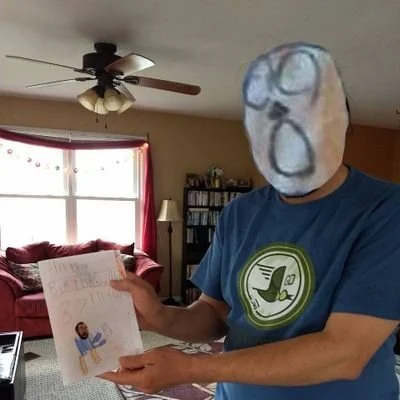I’m disappointed that they clearly don’t. The same tired justifications which amount to the ideals of Star Trek are a luxury made possible by hard men doing bad things in the dark.
Yeah. Reading the article, Section 31 seems great if you just want to just shit on everything else in the franchise. Nope, not for me.
I mean, in DS9, section 31 were clearly villains, right?
Not heroes in the shadow. This is what they told themselves in order to justify their shit.
It’s a fundamental misunderstanding of what Section 31 is supposed to be. Sloan wasn’t a good guy. 31 actively tried to commit genocide.
The idea behind them is that arguments of ends justifying the means and “getting dirty” to preserve higher ideals is morally, philosophically, and practically bankrupt. The Federation didn’t need 31 to win the war, and in fact, their methods would have made it much worse. Section 31 as a plot device exists to show us that there will always be those looking to use higher ideals to support terrible actions, and we must be constantly vigilant against them.
It truly pains me how that message has been twisted, and people think Section 31 are not only good guys but also cool.
The Federation didn’t need 31 to win the war
Do we know that for certain? The cure to the virus was actually pretty fundamental to the Female Changeling ordering the Jem’Hadar to stand down. She refused to surrender until Odo linked with her and cured her.
i think that the existence of the disease is more of a maguffin than the point that the solution was achieved without section 31… the “problem” could have been any number of unrelated things (eg some spacial anomaly threatening the founders for some reason, etc) and the fact that it’s s31 is more an interesting plot device to create other narratives around, rather than degrading the ultimate point
This is actually, how I understood it.
Sorry if I wasn’t clear; I didn’t mean to make it sound like an attack or a lecture. Section 31 is just one of my pet peeves in Trek for a while. We are in agreement! 😊
Villains or heroes isn’t the issue. It’s the argument that we need a group that doesn’t play by the rules that apply to the rest of society that I find problematic.
Shouldn’t we strive for a world in which the rules really do apply to all? Can’t we hope to conceive of a set of laws standards by which we should all be judged? Isn’t the world of Star Trek meant in some way to be aspirational, rather than just a reflection of what we have now?
We live in a world that has
wallsfederation worlds, and those federation worlds have to be guarded.Who’s gonna do it? You? You, Lieutenant Barclay?
Who’s gonna do it? You? You, Lieutenant Barclay?
Yes?
Lieutenant Barklay and the huge, powerful, and successful paramilitary organization who employs him are exactly who is supposed to guard Federation worlds. Which is what they do.
Not sure if you caught the reference, but the person you’re replying to was paraphrasing Nicholson’s line from A Few Goof Men. They’re likely not actually taking that position in the debate.
They were definitely villains in the series…but I don’t think DS9 ever made a strong case that they weren’t necessary (nor do I think they were trying to).
Right up until the end, the morphogenic virus was critical to the end of the war.
deleted by creator
I completely agree.
I’ve often thought that there must have been plenty of Section 31 operations that didn’t rise to the level of, you know, genocide, and that those operations were likely more ambiguous.
I’m hoping that whatever they’re up to in this movie is more in that vein - almost certainly illegal, but probably more ethically murky?
I think the dark humor is what kills this for me. A “mission impossible” style spy show set in the Star Trek universe would be fine. An empress from the mirror universe who gets her kicks killing and eating people with a wink and a nod to the audience isn’t anything I’m interested in.
Villains who’s engineered virus forced the Dominion to the negotiating table… just saying.
“Good and evil isn’t as black and white as TNG portrayed it” is kinda DS9’s whole deal.
Right, it’s Sisko’s “It’s easy to be an angel in paradise…” from season 1. That’s the main theme of the whole show - how do the Federation’s ideals hold up in significantly less than ideal conditions? What does it mean to be “the good guys” when all of the choices in front of you are varying degrees of bad?
People always mention the later seasons, understandably so, but it carries through the entire series. In some ways, it’s even more prominent in the early seasons when DS9 is portrayed as being pretty remote, Federation back up is far away, the main cast is own their own, and the Cardassian fleet is always nearby.
deleted by creator
“The people in the Federation exist in a bubble of safety and happiness, but there are outsiders to that sphere of the Federation—surrounded by the Dominion, the Founders, the Klingons [of this era], the [Romulan secret police] Tal Shiar, that don’t have the same moral relativity that we do. They would see [the Federation] destroyed to fit their moral relativism,” Kazinsky argued. “People need to understand why people don’t like the idea [of Section 31], but it hasn’t changed the idea.”
This kind of logic implies that stooping down to barbarism is OK as long as you are hypocritical about it.
I agree, that logic has been used to justify atrocities throughout history, including right now. It’s exactly what Israel says about Palestine, China about the Uyghurs, Trump about Mexican immigrants. And it’s completely antithetical to Star Trek’s values.
To be honest, that’s always been the core argument.
I don’t know where the line is - obviously, the morphogenic virus in DS9 was beyond the pale, but is it wise to expect hostile neighbours to be won over by sunshine and rainbows?
I feel like the big issue is the difference in how it’s portrayed. In DS9 and even enterprise section 31 are the bad guys. They are portrayed as a shadowy organization that thinks it’s doing the right thing but when confronted gets in the way. In DS9 they even lose. Section 31 arent an example of the end justifying the means being a necessary evil, they are something from within for the idealistic federation to overcome and defeat.
As a concept section 31 doesnt make a whole lot of sense lore wise because the federation is a paramilitary organization. Sure they are scientists, explorers, and philosophers at heart, but they are also very much a military Navy. We also see that starfleet does have a non section 31 intelligence complete with spies that go deep undercover get the trust of their enemies and sell them out. The federation knows the galaxy is a hostile place which is why they explore in heavily armed warships with a crew that follows a strict chain of command.
I think part of the wish fulfillment and idealism of the federation lies in the implication that they are also very powerful and able and willing to defend themselves with great force. Even the cruise ship Enterprise D was able to take on multiple enemy warships at once and win.
The major difference between section 31 and standard federation operating procedures seems to be their appetite for genocide and civilians.
It is a thing that has made me nervous about this new project since it was announced. Section 31 appearing as a bump in the road for our idealistic federation members to deal with works and allows them to stay the badguy. Them as the protagonists of a show or movie puts us in a situation where we get told stories where the ends justifies the means. And they either do this by making the federation seem naive and incompetent(which they arent they have a prime directive where they sterilize all life on a planet) or it has them justifying some heinous crap.
There’s a very clear line between having a military and intelligence services and having a MKULTRA-era-CIA-in-space.
Go on…
What is the line?

The two trailers put out on the Star Trek Youtube channel definitely didn’t calm my concerns about this movie!
There is no need, nor is it Star Trek, to have a dark evil underbelly that does all the real work. The true beauty of Star Trek is it makes us reflect on how far away we are from a utopian future version of society. Its an optimistic picture of the future, its the essence of what Star Trek is about.
inb4 someone on lemmy says a single piece of media they haven’t even seen is responsible for “shitting all over the entire franchise”EDIT: nvm
Ironic that the actor who seems to be the biggest Trek fan also played my least favorite character. Zeph was a cartoon.
[Gene] Roddenberry created a universe that was utopian in his ideals […] but people need to understand that these things don’t happen without sacrifice.
Yeah, Pike really should have thought of that in
The ones who walk away from OmelasLift us where suffering cannot reach.













